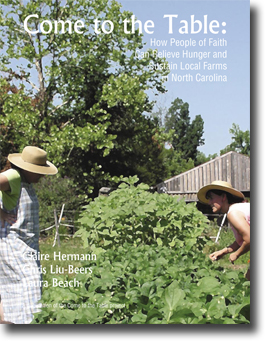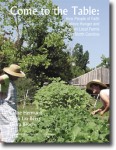How People of Faith can Relieve Hunger & Sustain Local Farms in NC

This 40-page guidebook includes an overview of the theology and issues surrounding farming and food security in North Carolina, easy tools for identifying the needs and resources in your community, example projects, and a resource list.
From the Introduction:
Anyone who happened to be in the basement of Biltmore United Methodist Church in Asheville, N.C., in April of 2007 would have witnessed two miracles. The first was a huge tureen of soup made entirely from produce grown on local farms despite a still-frosty mountain spring.
The second was a bit bigger. At tables around the room, over steaming bowls of soup, farmers sat down with leaders in hunger relief; farmworker advocates met with nutritionists; pastors talked with agriculture analysts; community workers and anti-poverty groups shared their perspective with community gardeners and local food processors.
These were some of the 300 people from around North Carolina who had gathered over three days that April to discuss how people of faith could relieve hunger and sustain local agriculture in our communities. At the end of those three days, we realized that the conversation was far from over.
This guide grew out of those three days. It provides a resource for individual or group reflection on the effects of food on faith and on our community. It offers stories from congregations who are exploring new ways of relating to their food, to each other, and to the land. It includes ways to put your faith in action with projects large and small. Some of these projects are complex, requiring thousands of dollars of grants, full-time employees, and multiple community partners. Some are as simple as a group of friends gathering for a meal and a conversation.
Everyone has something to offer that bears the seed-like potential to grow our communities into flourishing, lifegiving places. Farmers bring their knowledge of the land, passed down from generation to generation. Community organizers bring their passion for justice and a listening ear. And churches – even churches with the most limited of resources – have gifts that God is able to transform, as Christ once transformed a few loaves of bread and the day’s catch, into abundant harvests of food, peace, and love.
This guide will help you identify and nurture the seeds of potential in your community.

